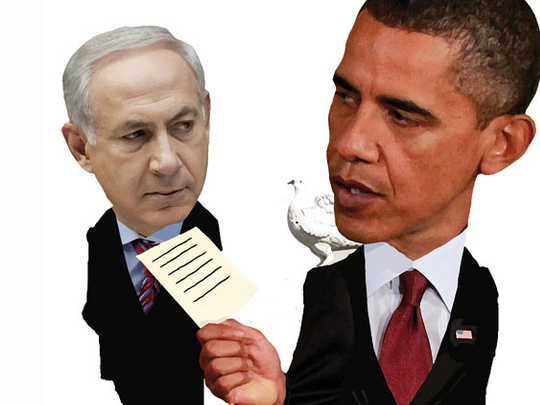
For its security, as well as econ-omically, politically and diplomatically, Israel is dependent on the United States. Since 1948, the US has reserved the largest portion of its aid for the Zionist state, making it a ‘strategic partner'. In spite of this, tension in the relationship could not be avoided.
With American voices questioning the costs of this strategic alliance and the linkage of Israeli security with that of the US, this very special relationship may have recently experienced some vicissitude. American officials are asking if their multifaceted support must be absolute, and if the US must defend any Israeli government irrespective of its policies. Should the US save Israel from itself, especially when it is in conflict with American interests, thanks to the policies of the present extremist, right-wing government?
Israel does not seem concerned about entangling the US in new wars. It has been accused of goading George W. Bush into conflict with Iraq, and it is now strongly endeavouring to encourage President Barack Obama into similar action against Iran. This is at a time when Israel, under Benjamin Netanyahu's right-wing government, encourages colonisation and ethnic cleansing in Palestine and is increasing the level of hatred against the US throughout the world. This is especially the case in the Arab and Muslim worlds, which will automatically beget the Islamic extremism that the US has been fighting since the attacks on September 11, 2001.
Change of leadership
The recent change in Washington's attitude to Israel is largely attributed to Obama's view of Israeli interests, which differ from those of his predecessor. Obama is more interested in the Israeli middle ground, which distances itself from the extremist right-wing. There is a growing feeling among pro-Israel Americans — and even among certain Israelis — that Netanyahu and his government are losing Washington's confidence. They worry that Israel can no longer assume that it is an indispensable ally because Israel's current policies are threatening American interests.
Here we should remember what two prominent American officials have said. The first was Secretary of Defence Robert Gates, who declared that "the lack of progress toward Middle East peace is clearly an issue that is exploited by our adversaries in the region and is a source of, certainly, political challenge. There is no question that the absence of Middle East peace does affect US national security interests in the region, in my view." This declaration came a few days after General David Petraeus, Commander of the United States Central Command, had declared that the Israeli-Palestinian conflict "foments anti-American sentiment due to a perception of US favouritism toward Israel". He continued: "Arab anger over the Palestinian question limits the strength and depth of US partnerships with governments and peoples in the AOR [Area of Responsibility] and weakens the legitimacy of moderate regimes in the Arab world". These sentiments are shared by other past and present prominent members of the US military, including former national security advisers and generals, such as General James Jones and Chairman of the Joint Chiefs of Staff Admiral Michael Mullen.
Losing patience
It has become clear that the "common values" on which Israel has depended to win American sympathy have become less important as a result of the growing list of Israeli atrocities against the Palestinians. Aharon David, Middle East consultant to former president Bill Clinton, has said that Obama is losing patience with Netanyahu. Obama, whose demands Netanyahu continually rejects or belittles, recently exacted some revenge by giving Netanyahu a chilly reception at the White House. In a lengthy meeting, he also made it clear to the Israeli prime minister that American support for Israel should not be taken for granted.
Since becoming president, Obama has reiterated that no peace is possible in the Middle East without the establishment of a Palestinian state, emphasising the importance of the two-state solution. This, according to numerous analysts, suggests that Washington believes it can only achieve its aims if it resolves the Arab-Israeli conflict, and perhaps also puts a halt to Iran's nuclear programme. Netanyahu's government is an obstacle in both cases. In particular, if Israel strikes against Iran, or persuades the US to do so, Iran will surely strike back at US military bases, and therefore drag the US into ategic consideration of the US. However, this security will not be attained unless Israel reaches a peace settlement with the Palestinians and the Syrians. As long as the US is Israel's benefactor, it has the right to insist that Israel behave itself and give due consideration to American interests.
Professor As'ad Abdul Rahman is the Chairman of the Palestinian Encyclopaedia.











